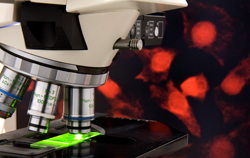Synthesis of CPPs as gene delivery vectors
Scientists from the CPP project designed synthesized and tested non-viral means of gene delivery based on cell penetrating peptides. Cell penetrating peptides facilitate the cellular uptake of peptides and proteins which contain them. Researchers investigated the structure of CPPs by synthesizing peptides which demonstrated systematic changes in their structure, charge and size. Modified ApoE-derived peptides were produced and their cellular uptake studied. The new methodology developed by the CPP project was very helpful in preparing extremely pure and well-characterised conjugates. When the uptake of cargo-CPP conjugates was studied using different cell cultures and analytical tools it showed significant accumulation within the cell. However, concentration is not only affected by the cell's uptake, but also by its ability to export material such as acidic peptides. However strongly basic peptides, and amphipathic peptides which display both hydrophilic and hydrophobic properties, are retained inside cells. This is probably achieved by binding to proteins or oligonucleotides, which are short segments of DNA or RNA, within the cell. The team also assessed the affect of novel CPP-conjugations on the biological activity of peptide nucleic acids (PNAs), artificially synthesized polymer mimics of DNA and RNA.







